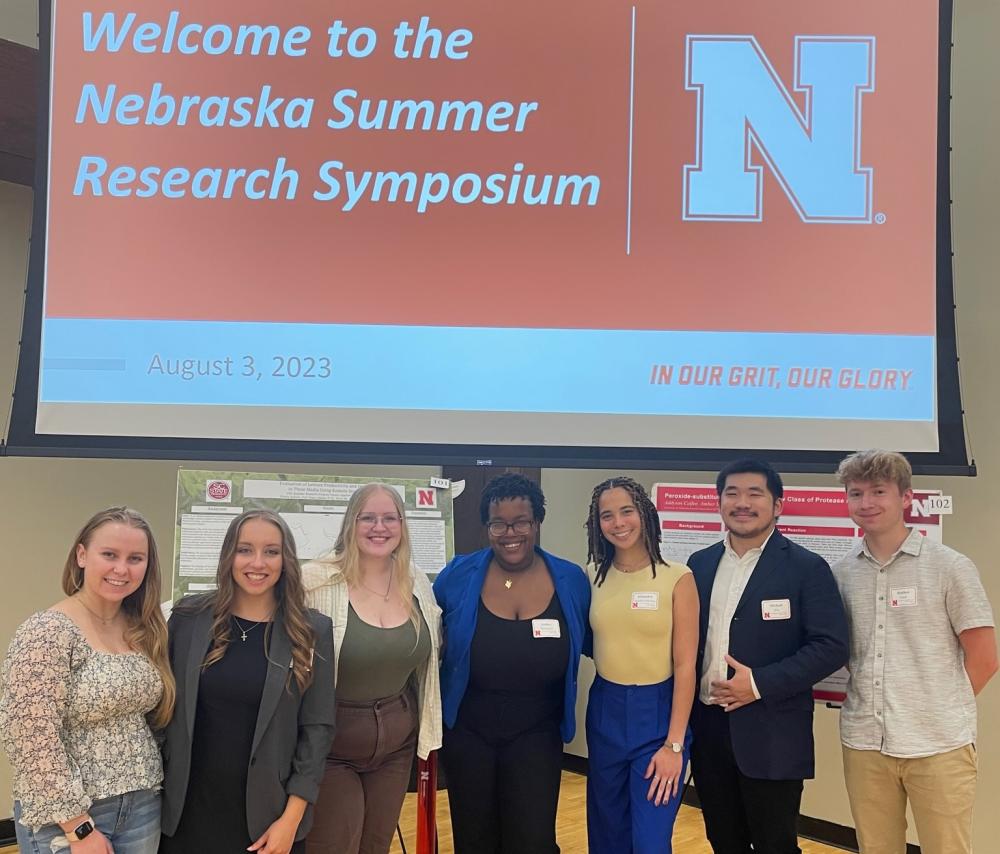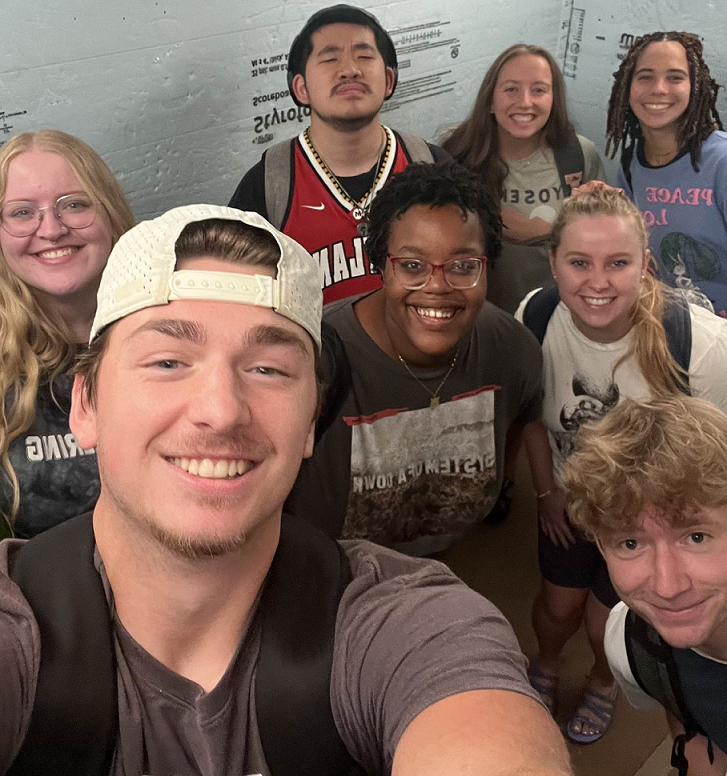
Creating knowledge to improve the education of engineers
For information contact
Funding Source

Who should apply
Related fields
- Education
Eligibility
Participation in the Nebraska Summer Research Program is limited to students who meet the following criteria:- U.S. Citizen or Permanent Resident
- Current undergraduate with at least one semester of coursework remaining before obtaining a bachelor's degree
See Eligibility for more information.
How to apply
Follow the application steps to submit the following materials.
About the Program
Students often confuse the practice of teaching, scholarly teaching, scholarship of teaching and learning, and education research, often associating engineering education research with improving individual teachers’ practices and assessment and failing to recognize its greater potential contributions to advancing all aspects of engineering education. This REU program provides opportunities to introduce students to the significance and rigor of the field of engineering education research. The program will allow students to fully participate in engineering education research topics that span a range of disciplines and contexts and provide a pathway into graduate level engineering education research.

Benefits
- Competitive stipend: $6,000
- Suite-style room and meal plan
- Travel expenses to and from Lincoln
- Campus parking and/or bus pass
- Full access to the Campus Recreation Center and campus library system
- Wireless internet access
Learn more about academic and financial benefits.
Events
- Department seminars and presentations
- Professional development workshops (e.g., applying to graduate school, taking the GRE)
- Welcome picnic
- Day trip to Omaha's Henry Doorly Zoo and Aquarium
- Outdoor adventures
- Research symposium
Mentors and Projects
Dr. Heidi Diefes-Dux, Dr. Grace Panther Biological Systems Engineering, Civil and Environmental Engineering
Evidencing Epidemic Change in Engineering Education (3 student openings possible)
The use of a wide array of teaching practices and strategies (WATPS) in higher STEM education has been shown to improve students’ conceptual understanding, appeal to a diverse set of students, and increase persistence in engineering, especially among underrepresented groups (Freeman et al., 2014; Kuh et al., 2006; President's Council, 2012; Seymour & Hewitt, 1997). Prior to the COVID-19 pandemic, many engineering instructors continued to use traditional teaching methods, hindering the formation of engineers. When universities switched to emergency remote teaching (Hodges et al., 2020), instructors experienced crisis-induced motivation to adopt teaching practices/strategies they had not used before. The overarching research question is: To what extent did instructors sustain, enhance, or extend their use of these practices and strategies?
Dr. Heidi Diefes-Dux, Dr. Erica Ryherd Biological Systems Engineering, Architectural Engineering
Analyzing Assessments for Virtual/Augmented-Reality-Based Discipline Exploration Rotations (VADERs)
The path to proficiency in engineering is long and difficult, often lacking displays of what it would be like to be an engineer and the positive societal impacts of engineering, weakening students’ interest (engagement) and confidence (self-efficacy) and perpetuating issues of retention and capacity building (National Academies, 2016). Virtual/Augmented-Reality-Based Discipline Exploration Rotations (VADERs) provide students with a platform to explore Architectural Engineering and its subdisciplines through virtual, mock-up healthcare spaces and interactions. VADERs are open-ended, human-computer interactions informed by the Model of Domain Learning (MDL, Kulilowich & Hepler, 2018) framework to help students visualize themselves in their chosen careers and enhance resiliency against the challenges of an engineering degree program.
Dr. Logan Perry Civil and Environmental Engineering
Building Broader Perspectives in Brazil: Construction Engineering Students’ Development of Intercultural Maturity During a Study Abroad Experience
This research project aims to investigate how construction engineering students' intercultural maturity changes as a result of a study abroad experience in Brazil. Intercultural maturity refers to the ways in which people develop the capacity to understand and act in ways that are interculturally aware and appropriate. Six construction students from a large university in the midwestern United States are the subjects of this work. Participants had opportunities to take courses, visit job sites, and connect with local Brazilian students throughout their experience abroad. The study will be conducted using a qualitative case study approach and leverage thematic analysis to identify the ways in which students’ intercultural maturity changed as a result of the experience.
Dr. Bonita Sharif School of Computing
Eye Movement Modeling Examples for Program Comprehension and Debugging
The goal of this project is to collect eye movement modeling examples from experts doing a) program comprehension tasks and b) debugging tasks on code examples commonly found in undergraduate computing curricula. Educators are typically aware of several major problems in comprehension and debugging that hinder student progress. The purpose is to expose the thought process of an expert through eye movement modeling examples specific to a context. The project proposes the creation of a repository of eye movement modeling video examples recorded by an expert for program comprehension and debugging tasks. The experts can be advanced graduate students fluent in the language of choice. This project helps novices learn by watching eye movements of experts as they work on comprehending programs (e.g., how to spot a code beacon) and while debugging. The videos will have a voice-over of the expert vocalizing their thought process. These videos can be used as teaching aids to help novices learn where to look, how to read code, and how to avoid areas that are not important to the task.
Dr. Bonita Sharif School of Computing
Towards Factors Classifying Novices and Experts in Debugging Tasks via Eye Tracking
Experts and novices have different reading behaviors on source code. Novices have a hard time understanding what a program does and finding the source of bugs during the run/edit programming cycle. Most expert/novice data on eye tracking has been on Java. This project seeks to collect data on Python from experts and novices solving debugging tasks. This will help build models that help us discern the different behaviors that separate experts from novices. The main research question will be to characterize factors that separate an expert from a novice solely based on eye tracking data.
Dr. Leen-Kiat Soh School of Computing
Intelligent Web-based Platform to Support Online Professional Learning Communities in CS Education (2 student openings possible)
Professional Learning Communities (PLCs) are a proven approach to improve teacher identity and engagement, leading to increased motivation and self-efficacy. Thus, PLCs can help teachers improve their instruction, directly impacting student learning and performance. However, teachers at rural areas might not have sufficient peers to form a PLC. This is particularly challenging for K-12 CS teachers as many schools either do not offer CS courses or only have one teacher teaching CS courses. Meanwhile, the advances in online or virtual community or collaborative platforms have grown tremendously due to the social media technologies. These platforms have features that enable or encourage collaboration and community activities, such as intelligent recommendations, informed sharing of resources, individualized experiences, and so on. This research project is aimed to develop a platform to support an online PLC for K-12 CS teachers using intelligent features, and to investigate the effectiveness of such features and how they impact teacher identity and their instruction.